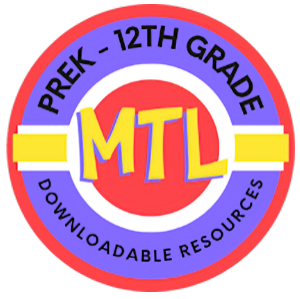Showing 141–160 of 1865 resultsSorted by latest
-
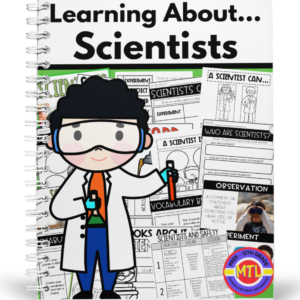 $5.50Buy Now
$5.50Buy NowIn this extended, interactive unit, students will learn all about scientists, what they do, the tools they use and science safety.
This is a LARGE unit. See description below for all that is included! Can be used as a notebooking unit.
-
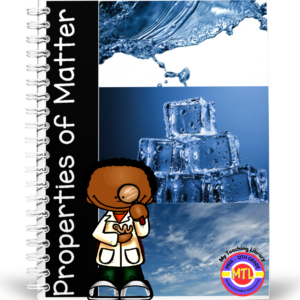 $3.00Buy Now
$3.00Buy NowAn engaging science unit teaching students about the properties of matter through hands-on and thought-provoking activities!
- Lesson 1: Matter (Define)
- Lesson 2: Solid, Liquid, Gas
- Lesson 3: Liquid Experiment
- Lesson 4: Solid Experiment
- Lesson 5: Gas Experiment
- Lesson 6: Liquid to Solid
- Lesson 7: Liquid to Gas
- Lesson 8: Irreversible Change
- Lesson 9: Reversible Change
- Lesson 10: Disassemble Change
-
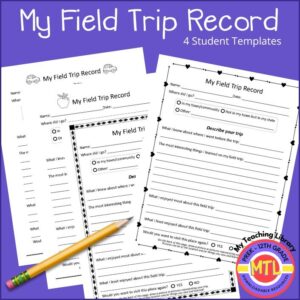 $1.50Buy Now
$1.50Buy NowHelp students get the most of their field trip experiences by having them complete these records logs after each trip! There are four different templates from which to choose and on each students will record where and when they went plus describe what they knew before the trip, what were the most interesting things learned and more.
-
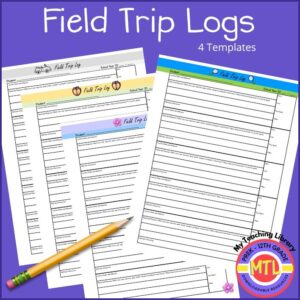 FREEBuy Now
FREEBuy NowKeep track of all your school year field trips with these easy-to-use record keeping forms!
Why keep records of your field trips? There are two main reasons. One is to document where you have been and what has been learned during the trip. The second reason is that it can be fun to look back on and see the places that have been visited. Teachers, homeschoolers and co-ops should always keep track of field trips to maintain an accurate record of student experiences, as well as accomplished objectives and goals.
-
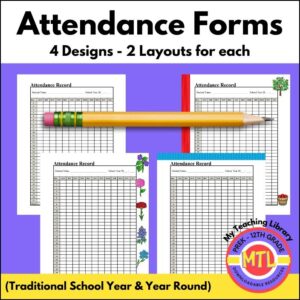 FREEBuy Now
FREEBuy NowKeep track of your students attendance with these beautiful school attendance form. There are four designs (plain, blue bar, apples, flowers) and each design has two layouts. One layout is from August through July and the second is January through December. So, whether you need to keep attendance based on a traditional school year or year round, you’ll have the perfect form.
-
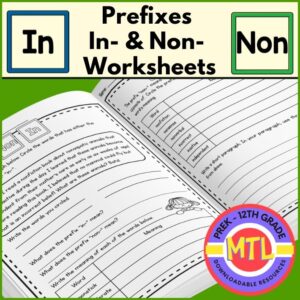 $1.25Buy Now
$1.25Buy NowTwo worksheets (with answer keys) to give students the opportunity to learn about and demonstrate their knowledge of words with the prefixes “in-“ and “non-“. Students will identify words with the prefix and give their meanings. Students will also demonstrate their ability to use those words within a written paragraph.
Words used in this resource:
nonfiction, nonaquatic, nonsense, nonverbal, nonstick, inconsiderate, incorrect, inactive, independent, invisible -
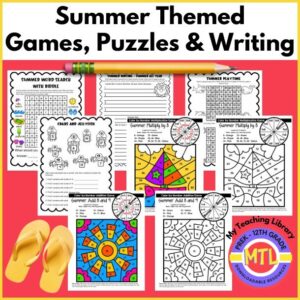 $2.00Buy Now
$2.00Buy NowFun pages with a summer theme, students will find 2 math color the picture games, 2 math puzzle worksheets, a riddle word search and an opinion writing page!
-
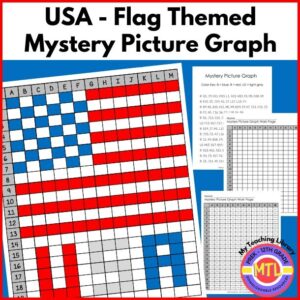 FREEBuy Now
FREEBuy NowThis fun, FREE picture graph is designed to give students practice in finding and plotting coordinates! With a theme of the USA and the American flag, it is perfect to use when studying the U.S. states, government and the flag. You can also use it during American holidays such as Memorial Day and/or the 4th of July!
This is STEM activity for both Math, and Geography.
-
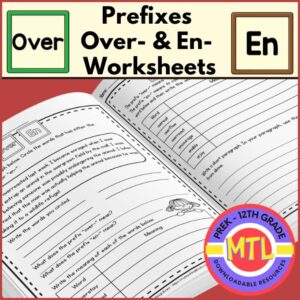 $1.25Buy Now
$1.25Buy NowTwo worksheets (with answer keys) to give students the opportunity to learn about and demonstrate their knowledge of words with the prefixes “over-“ and “en-“. Students will identify words with the prefix and give their meanings. Students will also demonstrate their ability to use those words within a written paragraph.
Words used in this resource:
overeat, overflow, overreact(ed), overstay, overgrown, overload, encourage, endangering, enraged, enable, enrich, enjoy, entrap -
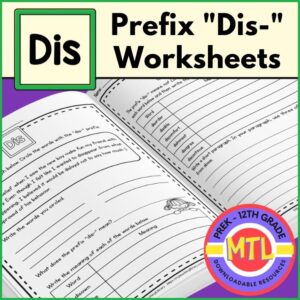 $1.25Buy Now
$1.25Buy NowTwo worksheets (with answer keys) to give students the opportunity to learn about and demonstrate their knowledge of words with the prefix “dis-“. Students will identify words with the prefix and give their meanings. Students will also demonstrate their ability to use those words within a written paragraph.
-
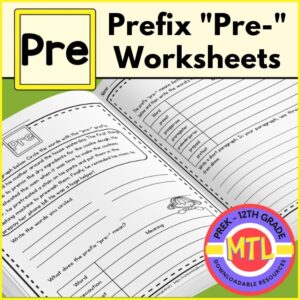 $1.25Buy Now
$1.25Buy NowTwo worksheets (with answer keys) to give students the opportunity to learn about and demonstrate their knowledge of words with the prefix “pre-“. Students will identify words with the prefix and give their meanings. Students will also demonstrate their ability to use those words within a written paragraph.
-
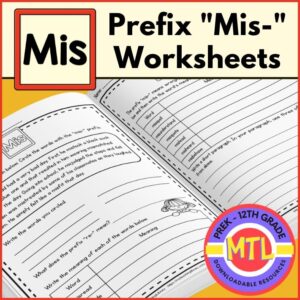 $1.25Buy Now
$1.25Buy NowTwo worksheets (with answer keys) to give students the opportunity to learn about and demonstrate their knowledge of words with the prefix “mis-“. Students will identify words with the prefix and give their meanings. Students will also demonstrate their ability to use those words within a written paragraph.
-
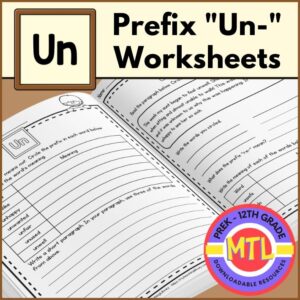 $1.25Buy Now
$1.25Buy NowTwo worksheets (with answer keys) to give students the opportunity to learn about and demonstrate their knowledge of words with the prefix “un-“. Students will identify words with the prefix and give their meanings. Students will also demonstrate their ability to use those words within a written paragraph.
-
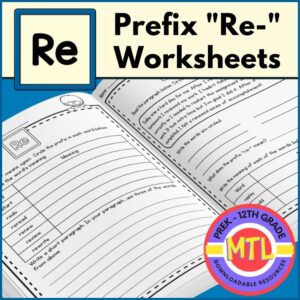 $1.25Buy Now
$1.25Buy NowTwo worksheets (with answer keys) to give students the opportunity to learn about the prefix “re-“. Students will identify words with the prefix and give their meanings. Students will also demonstrate their ability to use those words within a written paragraph.
-
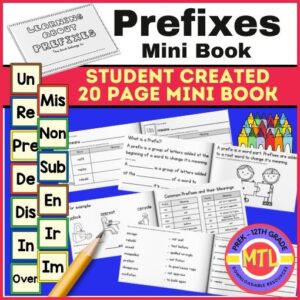 $2.50Buy Now
$2.50Buy NowWhen learning prefixes, this resource will give students the meanings of 13 common prefixes plus it will allow them to demonstrate their understanding through writing the meanings of words with the prefixes, matching words with their meanings and writing sentences. This is a great resource that will have students interactively learning while producing a 20 page mini book they can keep as a reference!
Prefixes included in this student created mini book are re-, un-, mis-, pre-, dis-, over-, non-, in-, im-, en-, de-, ir-, sub-
-
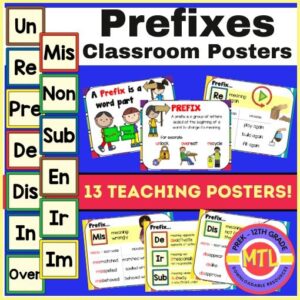 $3.50Buy Now
$3.50Buy NowIntroducing new vocabulary skills to students each year is crucial to their success in school. Sometimes it can seem a little overwhelming when trying to decode words and learn new concepts, but it doesn’t have to be! Teaching prefixes and suffixes is a great way to help your students master vocabulary and unknown words!
This resource concentrates on PREFIXES and provides you with 13 colorful teaching posters to help students learn 13 common prefixes: re-, un-, mis-, pre-, dis-, over-, non-, in-, im-, en-, de-, ir-, sub-
-
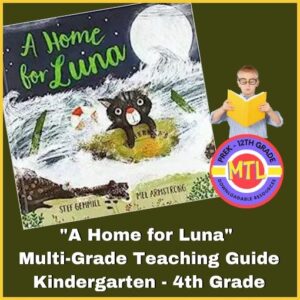 FREEBuy Now
FREEBuy NowA Home for Luna is a heart-warming tale about adapting to another place, displacement, our need for community and friendship, and the life-changing value of kindness.
About the story: When Luna washes up on a strange shore, she is scared and lonely. She shelters under a wooden crate and dreams of a home from long ago.She soon discovers there is beauty in her new land. “A smell filled the air. A smell like home, but not exactly.” Along the way Luna makes unexpected friends. But will she ever feel at home in a place so different from the one she remembers?
This teaching resource will help guide your teaching with this book and the themes that are contained within it. Themes include: relationships, conflict, homelessness, adapting to change. It is also a book that can lead to discussions on what living things need to survive, observable changes in our environment (sky and landscape), life cycles, ecosystems and sustainability.
-
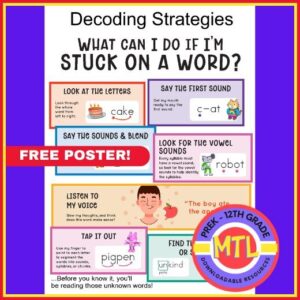 FREEBuy Now
FREEBuy NowHere is a free printable poster which includes a variety of decoding strategies all in one place to aid students struggling to decode new words!
-
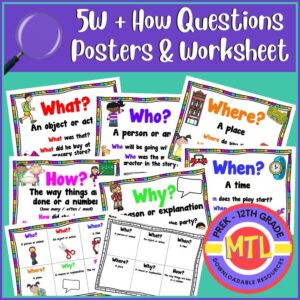 $2.50Buy Now
$2.50Buy NowHelp students learn the basic reading comprehension questions, the 5Ws plus how, with these teaching posters plus a worksheet for practice! There is a colorful, fun poster for each question (who , what, where, why, when and how) plus a poster showing all six. The worksheet gives students the space to write or draw their answers and can be used with any resource.
-
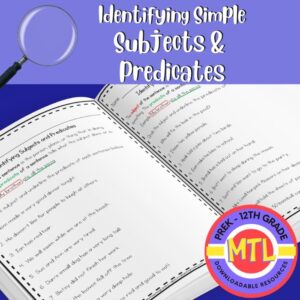 $1.50Buy Now
$1.50Buy NowTwo worksheets for students to use to demonstrate their ability to identify a simply subject and predicate within a sentence! Answer keys are included.
